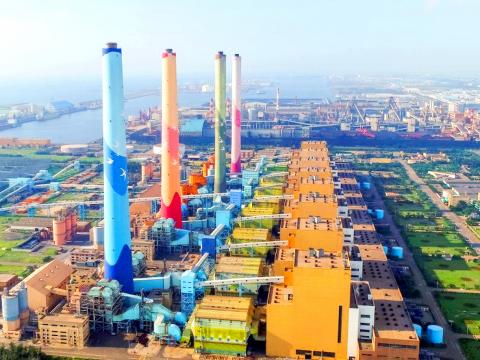Some provisions of legislation implemented by the Taichung City Government to reduce the use of coal are invalid, the Executive Yuan said on Friday, as the central government tries to settle the fate of the Taichung Power Plant.
The city government said that it would seek an interpretation from the Council of Grand Justices.
The Executive Yuan said in a statement that it had informed the city government of its decision, on the grounds that Taichung’s Autonomous Act for Coal Regulation (台中市管制生煤自治條例), enacted on Jan. 26, 2016, conflicts with the central government’s Air Pollution Control Act (空氣污染防制法) and other laws.

Photo: Huang Chung-shan, Taipei Times
At that time, the Environmental Protection Administration (EPA) and the Ministry of Economic Affairs found that some rules enacted by Taichung authorities contradicted the Air Pollution Control Act, the Executive Yuan said.
On May 4, 2016, it asked the local government to reassess its regulations, but to no avail, it said.
The Air Pollution Control Act was last amended on Aug. 1, 2018, and the EPA on July 29 last year directed all local governments to review whether their rules conflicted with the law, the Executive Yuan said.
The Executive Yuan said that the Taichung City Government had been unresponsive to calls to amend its rules, and last month, it asked Taichung for the third time to bring its policy in line with the amended law.
The central government’s request is believed to be aimed at resolving a dispute over the city government’s decision to revoke permits for two generators at the fossil fuel-powered Taichung Power Plant.
The city in December last year said that it was revoking the coal use permits for the plant’s No. 2 and No. 3 generators, effective in January, after claiming that the power plant had breached the Autonomous Act for Coal Regulation three times last year.
However, the EPA last month overturned the decision, saying that it was based on a misstatement of the facts and a lack of just cause.
In 2017, then-Taichung mayor Lin Chia-lung (林佳龍) of the Democratic Progressive Party (DPP) issued a permit that allowed the plant to burn up to 16 million tonnes of coal a year, and to reduce its consumption by 3 million tonnes last year, said state-run Taiwan Power Co, which operates the Taichung plant.
In 2018, Lu Shiow-yen (盧秀燕) of the Chinese Nationalist Party (KMT) was elected mayor and set a new consumption limit of 11.04 million tonnes to assuage public anger toward the plant, which is considered to be a major source of air pollution in central Taiwan.
KMT Culture and Communications Committee acting director Alicia Wang (王育敏) accused the DPP of political manipulation in its decision by taking advantage of a time when the COVID-19 pandemic has not yet shown signs of abating.
She urged the Executive Yuan not to apply double standards, but to respect the local government’s autonomy and jointly find a solution to Taiwan’s serious air pollution.

A small number of Taiwanese this year lost their citizenship rights after traveling in China and obtaining a one-time Chinese passport to cross the border into Russia, a source said today. The people signed up through Chinese travel agencies for tours of neighboring Russia with companies claiming they could obtain Russian visas and fast-track border clearance, the source said on condition of anonymity. The travelers were actually issued one-time-use Chinese passports, they said. Taiwanese are prohibited from holding a Chinese passport or household registration. If found to have a Chinese ID, they may lose their resident status under Article 9-1

Taiwanese were praised for their composure after a video filmed by Taiwanese tourists capturing the moment a magnitude 7.5 earthquake struck Japan’s Aomori Prefecture went viral on social media. The video shows a hotel room shaking violently amid Monday’s quake, with objects falling to the ground. Two Taiwanese began filming with their mobile phones, while two others held the sides of a TV to prevent it from falling. When the shaking stopped, the pair calmly took down the TV and laid it flat on a tatami mat, the video shows. The video also captured the group talking about the safety of their companions bathing

PROBLEMATIC APP: Citing more than 1,000 fraud cases, the government is taking the app down for a year, but opposition voices are calling it censorship Chinese Nationalist Party (KMT) Chairwoman Cheng Li-wun (鄭麗文) yesterday decried a government plan to suspend access to Chinese social media platform Xiaohongshu (小紅書) for one year as censorship, while the Presidential Office backed the plan. The Ministry of the Interior on Thursday cited security risks and accusations that the Instagram-like app, known as Rednote in English, had figured in more than 1,700 fraud cases since last year. The company, which has about 3 million users in Taiwan, has not yet responded to requests for comment. “Many people online are already asking ‘How to climb over the firewall to access Xiaohongshu,’” Cheng posted on

A classified Pentagon-produced, multiyear assessment — the Overmatch brief — highlighted unreported Chinese capabilities to destroy US military assets and identified US supply chain choke points, painting a disturbing picture of waning US military might, a New York Times editorial published on Monday said. US Secretary of Defense Pete Hegseth’s comments in November last year that “we lose every time” in Pentagon-conducted war games pitting the US against China further highlighted the uncertainty about the US’ capability to intervene in the event of a Chinese invasion of Taiwan. “It shows the Pentagon’s overreliance on expensive, vulnerable weapons as adversaries field cheap, technologically